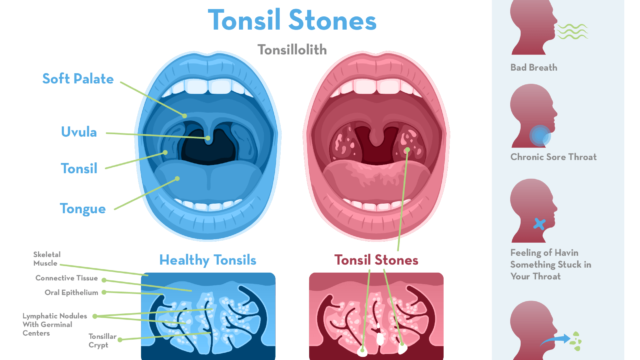Tonsil stones and tonsilolitis were common in most people. They tend to cause some soreness in the tonsils and skin of the tonsils. They can also cause bleeding of the skin when the tonsils are pushed forward. It is important to know how to prevent them.
Symptoms usually go away quickly after a few days. Tonsiloliths are not contagious, but they sometimes cause infections (such as flu and colds). To prevent the spread of these infections: Keep your child at home or away from work until you or he feels better. If you find that your child has a tonsil stone, take him to the hospital immediately. There are many ways to treat this condition.
If your child has a tonsil stone, chances are high that it will inflame the mucous membranes and can cause soreness and foul odor. It is also possible that this infection can spread to other parts of your body. In extreme cases, your child may develop an abscess and need surgery.
Tonsil stones can also be caused by bacteria in the throat. It can be caused by a change in diet, medication, or even just smoking. It is important to keep your tonsils clean to avoid causing inflammation of the tonsils.
To reduce pain and inflammation associated with tonsil stones, your doctor will likely recommend a course of antibiotics. They are usually not recommended for children who have only had mild cases of tonsillitis. For these children, a doctor may recommend decongestants, corticosteroids, or a combination of both. Your doctor may also prescribe a special nasal spray to get rid of bad breath that can be associated with tonsil stones. The optimal course of action will depend on your child's health.
Because tonsil stones are caused by bacteria and can be irritating, they should be treated immediately with a solution that will kill the infection. bacteria and eliminate the bacteria that cause them

A mouthwash containing antibacterial agents such as diflucan, neosporin, or listerine is usually recommended. Mouthwashes containing alcohol should be avoided as they can dry out the tonsils and surrounding mucous membranes. It can also irritate the mouth and tongue. A mouthwash containing zinc oxide, colloidal silver, or hydrogen peroxide is a good remedy for tonsilolitis.
Antibiotics can help treat sore throat caused by tonsillitis. Antibiotics can also reduce redness and pain caused by tonsillitis and help remove stones from the throat and tonsils. The Oral Irrigator can be used to clean the tonsils and crypts of the tonsils. When using an irrigator, it is important to wash your teeth regularly. It is recommended that you consult with your doctor to decide which oral irrigator is best for your child.
If the tonsilolitis is very large, surgery is often required to remove it. There are many ways to surgically remove tonsilolitis.
Tonsiloliths often form in pockets inside the tonsils. If your tonsils are inflamed and swollen, you can surgically remove the tonsils. This is usually done when tonsiloliths are large but smaller than the amygdala.
Sometimes tonsiloliths can grow into the tonsils and into the crypts of the tonsils. In this case, tonsiloliths will be removed by excision. An operation is also used to remove a large tonsil. Aspirin, chlorhexidine, or tetracycline are common inducers of anesthesia in the treatment of tonsilolitis.
Tonsillitis and tonsil stones are treatable and often treatable. Remember that if you notice that pain, swelling, or redness persists, see your doctor right away. In many cases, the disease goes away on its own.